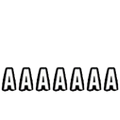Personally I hope this fucky wucky drives a stake through tik tok and actually gets a bunch of Yankees on actual Chinese apps and lead to a cultural transformation like we saw with the era of Japan's soft power impact on U.S culture. But paint it fucking RED BABY!
Trump says he will issue an executive order Monday to get TikTok back up
President-elect Donald Trump said Sunday that he plans to issue an executive order that would give TikTok’s China-based parent company more time to find an approved buyer before the popular video-sharing platform is subject to a permanent U.S.ban.
Trump announced the decision in a post on his Truth Social account as millions of TikTok users in the U.S. awoke to discover they could no longer access the TikTok app or platform. Google and Apple removed the app from their digital stores to comply with a federal law that required them to do so if TikTok parent company ByteDance didn’t sell its U.S. operation to an approved buyer by Sunday.
He said his order would “extend the period of time before the law’s prohibitions take effect” and “confirm that there will be no liability for any company that helped keep TikTok from going dark before my order.
“Americans deserve to see our exciting Inauguration on Monday, as well as other events and conversations,” Trump wrote.
The law gives the sitting president authority to grant a 90-day extension if a viable sale is underway. Although investors made a few offers, ByteDance previously said it would not sell. In his post on Sunday, Trump said he “would like the United States to have a 50% ownership position in a joint venture,” but it was not immediately clear if he was referring to the government of an American company.
“By doing this, we save TikTok, keep it in good hands and allow it to say up,” Trump wrote. “Without U.S. approval, there is no Tik Tok. With our approval, it is worth hundreds of billions of dollars - maybe trillions.”
The federal law required ByteDance to cut ties with the platform’s U.S. operations by Sunday due to national security concerns posed by the app’s Chinese roots. THe law passed with wide bipartisan support in April, and U.S. President Joe Biden quickly signed it. TikTok and ByteDance sued on First Amendment grounds, and the U.S. Supreme Court upheld the statute on Friday.
Millions of TikTok users in the U.S. were no longer able to watch or post videos on the platform as of Saturday night. “A law banning TikTok has been enacted in the U.S.,” a pop-up message informed users who opened the TikTok app and tried to scroll through videos. “Unfortunately that means you can’t use TikTok for now.”
“A law banning TikTok has been enacted in the U.S.,” a pop-up message informed users who opened the TikTok app and tried to scroll through videos. “Unfortunately that means you can’t use TikTok for now.”
The service interruption TikTok instituted hours early caught most users by surprise. Experts had said the law as written did not require TikTok to take down its platform, only for app stores to remove it. Current users were expected to continue to have access to videos until the app stopped working due to a lack of updates.
The company’s app also was removed from prominent app stores, including the ones operated by Apple and Google. Apple told customers with its devices that it also took down other apps developed by TikTok’s China-based parent company, including one that some social media influencers had promoted as an alternative.
The Biden administration stressed in recent days that it did not intend to implement or enforce the nationwide ban before Trump takes office on Monday. Trump, who once favored a TikTok ban, said in an NBC News interview on Saturday that he was thinking about granting ByteDance a 90-day extension to find an approved buyer for the app’s U.S. operations.
“We are fortunate that President Trump has indicated that he will work with us on a solution to reinstate TikTok once he takes office. Please stay tuned,” read the pop-up message the app’s users now see under the headline, “Sorry, TikTok isn’t available right now.”
The only option the message gives to U.S. users is to close the app or click another option leading them to the platform’s website. There, users are shown the same message and given the option to download their data, an action that TikTok previously said may take days to process.
Apple said in a statement on its website that three TikTok apps and eight other ByteDance-created apps were no longer available in the U.S., while visitors to the country might have limited access. The removed apps included video-editing program CapCut, art editing program Hypic and Lemon8, a video-sharing app that includes some of the same features as TikTok.
“Apple is obligated to follow the laws in the jurisdictions where it operates,” the company said.
Apple said the apps would remain on the devices of people who already had them installed, but in-app purchases and new subscriptions no longer were possible and that operating updates to iPhones and iPads might affect the apps’ performance.
The federal law banning TikTok allows the sitting president to extend Sunday’s deadline by 90 days if a sale is in progress. But no clear buyers have emerged, and ByteDance previously said it would not sell TikTok.
Trump told NBC News on Saturday that if decides to grand such an extension, it would “probably” be announced Monday after he is sworn in as president. TikTok CEO Shou Chew is expected to attend Trump’s inauguration with a prime seating location.
Chew posted a video late Saturday thanking Trump for his commitment to work with the company to keep the app available in the U.S. and a “strong stand for the First Amendment and against arbitrary censorship.”
“We are grateful and pleased to have the support of a president who truly understands our platform. One who has used talk to express his own thoughts and perspectives, connecting with the world and generating more than 60 billion views of his content in the process,” Chew said.
On Saturday, artificial intelligence startup Perplexity AI submitted a proposal to ByteDance to create a new entity that merges Perplexity with TikTok’s U.S. business, according to a person familiar with the matter.
Perplexity is not asking to purchase the ByteDance algorithm that feeds TikTok user’s videos based on their interests and has made the platform such a phenomenon.
Other investors have also been eyeing TikTok. “Shark Tank” star Kevin O’Leary recently said a consortium of investors that he and billionaire Frank McCourt put together offered ByteDance $20 billion in cash. Trump’s Treasury Secretary Steven Mnuchin also said last year that he was putting together an investor group to buy TikTok.
In Washington, lawmakers and administration officials have long raised concerns about the app, maintaining it is a national security threat due to its Chinese ownership and the large amount of information it gathers about American users.
While defending the law in court, the Biden administration argued it was concerned about TikTok collecting vast swaths of U.S. user data that could fall into the hands of the Chinese government through coercion.
Officials have also warned the algorithm that fuels what users see on the app is vulnerable to manipulation by Chinese authorities, who can use it to shape content on the platform in a way that’s difficult to detect. But to date, the U.S. has not publicly provided evidence of TikTok handing user data to Chinese authorities or tinkering with its algorithm to benefit Chinese interests.
The Supreme Court unanimously decided on Friday the risk to national security posed by TikTok’s ties to China overcomes concerns about limiting speech by the app or its 170 million users in the United States.
After TikTok’s service started going dark, some in China slammed the U.S. and accused it of suppressing the popular app. In a post on the Chinese social media platform Weibo, Hu Xijin, a former editor-in-chief for the Chinese Communist Party-run newspaper Global Times, said “TikTok’s announcement to halt services in America marks the darkest moment in the development of internet.”
“A country that claims to have the most freedom of speech has carried out the most brutal suppression of an internet application,” said Hu, who is now a political commentator. TikTok does not operate in China, where ByteDance instead offers Douyin, the Chinese sibling of TikTok that follows Beijing’s strict censorship rules.
Under the law, mobile app stores are barred from offering TikTok and internet hosting services are prohibited from delivering the service to American users. Violators could incur fines of up to $5,000 for each user who continued to access TikTok, meaning penalties the companies could face if they continue offering TikTok could total to a large sum.
 you're gonna post main in your beanposts right?
you're gonna post main in your beanposts right?


 TAKE ME OUT TO THE BALL GAME, BABY!
TAKE ME OUT TO THE BALL GAME, BABY!








That's the whole point of the art piece